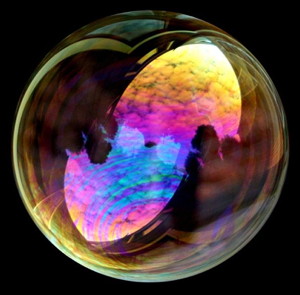
Tachyon vesicles are naturally-occurring piezogravitational bubbles composed mostly of quintessent matter. They are usually found in interstellar space, in comets, and in the rings of gas giants. Physically, they resemble soap bubbles without the fragility. When stimulated by coherent radiation, tachyon vesicles produce four distinct effects: antigravity, ultrawave, tachyon conversion, and defense screens.
Antigravity
hen stimulated by coherent radiation, a tachyon vseicle produce a grav field which is highly directionsal and variable in intensity. By allowing the vesicles free movement, and by varying intensity and wavelength of the radiation, almost any grav effect can be produced. Generally, since stimulated vesicles are fragile, total vesicle mass should be at least 0.00000364 of the mass being moved.
Ultrawave
A stimulated tachyon vesicle produces a single ultrawave tone. These tones range through six octaves on the UW Effect Scale. Amplitude modulation carries a signal which can be detected in a receiving set. By the variation introduced into the receiving vesicle, decoding can be accomplished even if the two units are not tuned to the same note -- although best results are obtained from units tuned to whole multiples of an octave apart.
A "keyed" ultrawave circuit obtains between to sub-vesicles produced from the same parent. Since each vesicle is extremely sensitive to its twin(s), very low amplitude can carry a signal undetectable even to vesicles tuned to the same note. Keyed ultrawave communication does not pass through Ultrawave Relays and can be used across most of the Galaxy.
The Free Peoples of the Scattered Worlds use a frequency modulation ultrawave signal which is totally undetectable without the tunable antigrav.
Tachyon Conversion (FTL drive)
Conversion to tachyon (faster-than-light) phase is a catastrophic effect that takes place when a tachyon vesicle is overloaded with energy. In response, the vesicle expends energy by producing a field which converts all particles within into their tachyon equivalents. The triggering energy varies on a logarithmic scale, according to the total mass of the system. Masses above 10^25 kg cannot be converted; the vesicle(s) will destabilize first.
The radius of the conversion field is determined by the total mass of vesicles used, and is given by r = 1.65*(m)^(1/3).
In the presence of too many shifting grav fields, tachyon vesicles will destabilize; the precise destabilization potential (and hence, speed limits) are given by Basse's Law. In practical terms, Basse's Law limits the speed of FTL travel within the Galaxy to roughly 500 parsecs/hour.
Defense Screens
A rotating tachyon vesicle, within a grav field produced by a resonating vesicle, creates a primitive version of the K1 defense screen. Variations in energy, rotation, frequency, etc. can modulate the field to just about any desired configuration.
The L-type pressure screen is a sophisticated antigrav effect, rather than a true defense screen.
Defense Screen Types:
-
K1: Absorbs radiant energy, kinetic energy of objects faster than 50% lightspeed; overloads and explodes when radiation passes violet.
-
K2: Like K1 but radiates well into ultraviolet before failure.
-
K3: "Full coverage" - reflects all radiant energy and matter. Development of the Federation of Kindreds.
-
K4: "Antishock" or "Anticrash" -- kinetic damper, can be set for any range -- must be used in connection with another K-type field for radiation. Developed by Federation of Kindreds.
-
K5: Absorbs all of the above, radiates as neutrinos. Fails when neutrino radiation passes Moore's Limit. Developed in Late Second Empire.